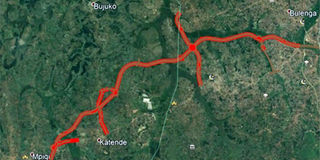Shs547b road contract given to banned firms

The road. A locator outline showing the stretch and structure of the Busega-Mpigi Expressway. FILE PHOTO
The two Chinese firms that formed the joint venture of China Civil Engineering Construction Corporation and China Railway 19th Bureau Company Limited, and won the tender for the construction of the proposed Shs547.7b 23km Busega-Mpigi Expressway, were blacklisted by the World Bank.
The Uganda National Roads Authority (Unra) announced the award of the contract on July 11, two months after the World Bank announced that it had blacklisted the two firms effective June.
Given that both the World Bank and the African Development Bank (ADB) have cross-debarment agreements, which means when a firm is blacklisted by any one of them, it has to be blacklisted by the other, the firms would be ineligible for the award of the contract, which is meant to be executed with funding from ADB.
A June 5 press statement published on the World Bank’s website, www.worldbank.org/en/projects-operations/procurement/debarred-firms, indicates that the firms were blacklisted for “misconduct during the procurement process” for a road project in Georgia, eastern Europe.
“…During the prequalification and bidding process for a highway construction contract, the three named companies prepared and submitted information that misrepresented the personnel and equipment of CR23 and the experience of other entities in its group as CRCC’s. Within the World Bank’s administrative Sanctions System, these actions are considered fraudulent practices…” the statement read in parts.
The list of debarred companies and individuals is public and updated every three hours, which raises questions why or how Unra could not have had it in mind during the procurement process.
Mr Allan Ssempebwa Kyobe, the media officer in the office of the Unra executive director, Ms Allen Kagima, however, said Unra had been aware of the blacklisting, but was informed that it would not affect this particular contract.
“Before we award a contract, the funder is given notification and given time to carry out due diligence on the proposed contractor. In this case, we notified the ADB and got a no objection. Our teams did not find any hindrance to this joint venture,” he told this newspaper on Thursday morning.
At the same time, a whistle blower penned a July 18, 2018 letter to the country manager of ADB, in which the person accused Unra of mismanaging the bids evaluation exercise by, among other things, compelling bidders to renew their bids and bid securities and doing back-and-forth movements between two evaluation teams, a due diligence team set up by the Unra executive director and the contracts Committee.
“The findings of each of these committees seems to suggest that they are either looking at different bids or depending on the motivation, each committee sees and understands the contents of the bid in a significantly different manner from the others,” the letter reads, in part.
In the same letter, which was copied to the Inspector General of Government (IGG) and copied to Unra and the Public Procurement and Disposal of Assets Authority (PPDA), the whistle blower also accused Unra of having ignored grave eligibility issues surrounding the two firms.
Although the letter was marked as received by the ADB Uganda’s office on July 18 last year, the office did not act on the same petition. Most strange, however, is the fact that ADB did not object to the contract award given that it has cross-debarment agreements with the World Bank.
By press time, this newspaper was not able to get ADB to explain why it gave a no-objection to the award of the contract despite the existence of a cross disbarment agreement with the World Bank.
Mr Kyobe, however said: “That matter was brought to Unra’s attention, but the category for which their sister company was black listed did not apply to the joint venture that eventually scooped the award,” he said.
But this contradicts the World Bank’s position.
“The debarment also extends to CRCC’s 730 controlled affiliates, with the exception of China Railway 20th Bureau Group Co. and its controlled affiliates, which were subject to a separate settlement agreement with the World Bank in 2017,” the June 5 statement read in part.
Cross debarment is an agreement among the African Development Bank Group, Asian Development Bank, European Bank for Reconstruction and Development, Inter-American Development Bank and the World Bank Group aimed at mutually enforcing each other’s debarment actions with respect to the four harmonized sanctionable practices like corruption, fraud, coercion and collusion.
Sunday Monitor has also established that on September 11, 2018, a whistle blower wrote a letter to the Inspectorate of Government (IGG) and the Public Procurement and Disposal of Assets Authority (PPDA), raising issues with the manner in which Unra was handling the bidding process, but that the petition was not responded to, an assertion which the spokesperson of the IGG, Ms Ali Munira, disputes.
“We received the petition last year and forwarded it to PPDA. There is no new petition around that matter,” she said in a telephone interview yesterday.
Debarment
The agreement on mutual enforcement of debarment decision was signed on April 9, 2010 and became operational in June 2010 for the Asian Development Bank, July 2010 for both the World Bank and the European Bank for Reconstruction and Development, May 2011 for the Inter-American Development Bank - 9 May 2011 and July 2012 for the African Development Bank.



